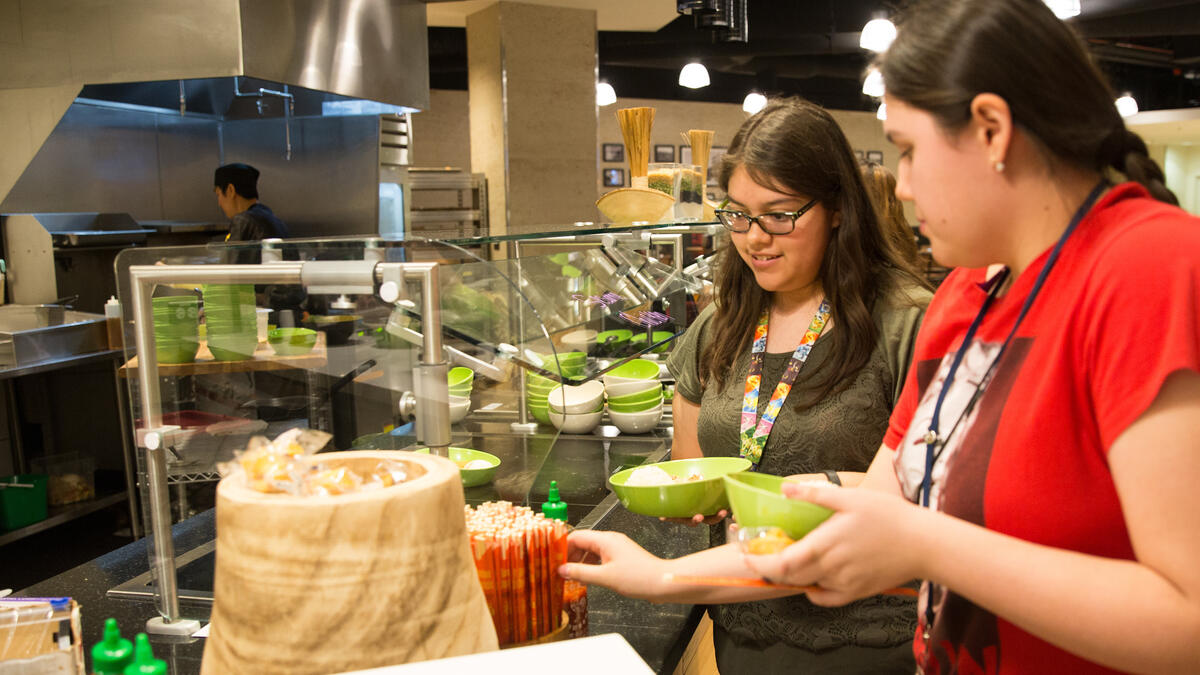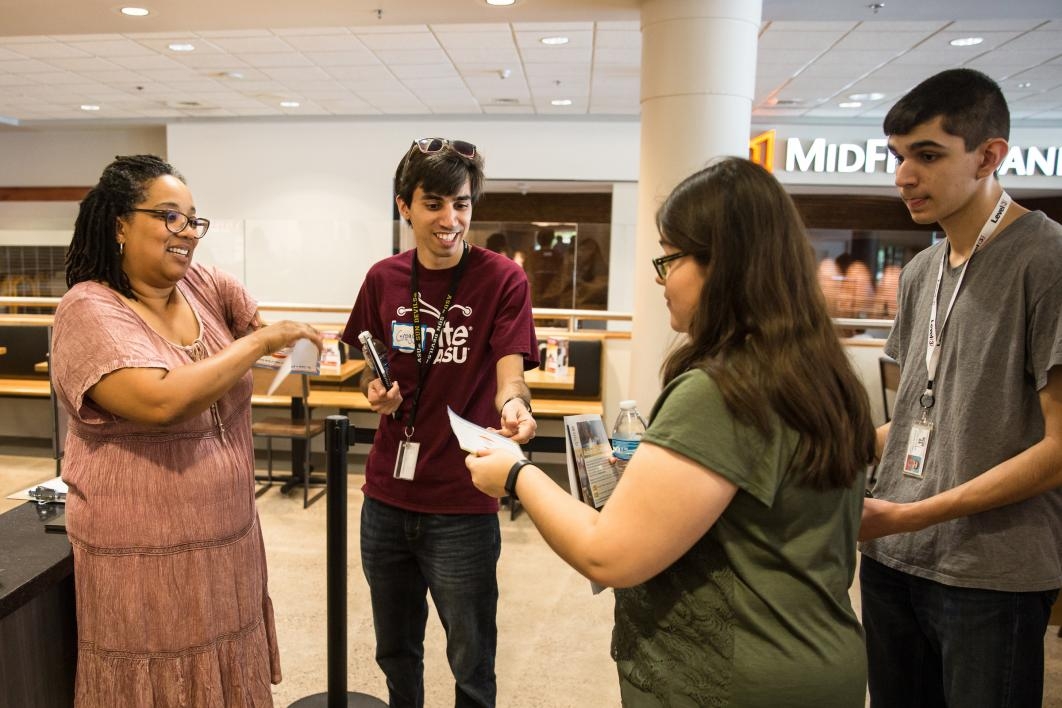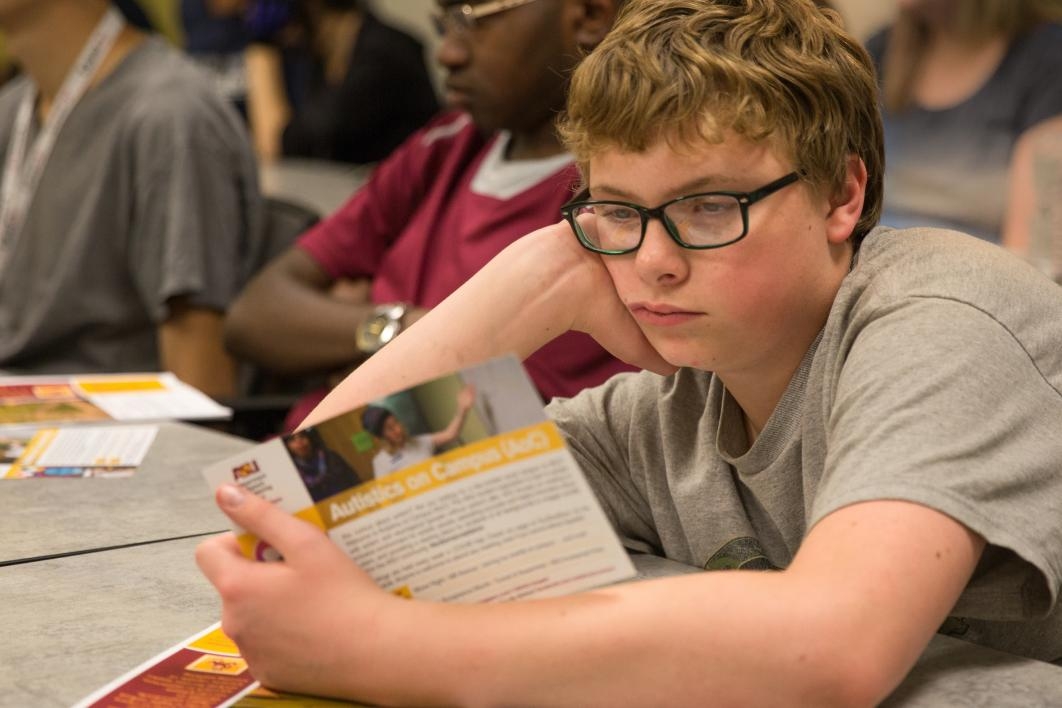Autistics on Campus bust myths, show young students that college is possible

The shift from high school to college isn’t always an easy one. The newfound independence can be both freeing and intimidating — especially if you’re autistic.
“The transition to college was very frightening for me,” Jane Smith* said. “Many autistic high schoolers are already struggling to function at their current level of independence. … Being pushed to be even more independent, especially if you don't feel developmentally ready, can be terrifying.”
Smith, a computer science undergrad at Arizona State University, is more comfortable these days, thanks in part to her involvement in Autistics on Campus, a group that provides a judgement-free space for autistic students to socialize and spread awareness and acceptance of the disorder. Earlier this monthApril is Autism Awareness Month., AoC members engaged in their first community-outreach endeavor when they welcomed a group of autistic Tempe High School students to ASU’s Tempe campus for a tour and panel discussion about college life.
There was some initial hesitance from the high schoolers after they filed into a classroom on the second floor of Coor Hall, where the discussion was held. But once the AoC group members began sharing their personal stories, hands were flying up to ask questions.
Greggory Ohannessian, an interdisciplinary studies grad student, recalled a time when he almost missed the shuttle from ASU’s West campus to Tempe.
“If that happens, don’t panic,” he said. There’s always another on its way.
Other nuggets of wisdom AoC members shared included reaching out to the ASU Disability Resource Center. With a location on each campus, the center is easily accessible and offers a number of services, including special testing accommodations, note-taking assistance and equipment rental.
“If you’re coming to ASU, you need to go talk to these people,” business undergrad Daryn Nehrkorn said before moving on to the topic of student clubs. Aside from the AoC, he listed off clubs for such activities as cosplay, video games and Quidditch, which drew excited gasps from the high school students.
“Like, Harry Potter Quidditch?” one asked.
“Yes,” Nehrkorn said. “But I don’t think they’ve figured out how to make the brooms fly yet.”
On the way from Coor Hall to the Memorial Union for lunch, Nehrkorn chatted easily with Tempe High sophomore Austin Hartwell. Hartwell was impressed with the size of the campus but acknowledged it was also a bit daunting. If he decides to come to ASU, he said, he most likely will join the AoC.
Finding a group of “like-minded” peers can be difficult among such a large student population, AoC faculty adviser Maria Dixon said. She attributes the tongue-in-cheek phrase to the students who established the AoC nearly a year and a half ago after coming to her for help communicating better with students and professors.
Dixon, a speech language pathologist and clinical associate professor in ASU’s Department of Speech and Hearing Science, said she realized that what the students were looking for might be better served as a student organization where they could regularly engage with other autistic students who were experiencing similar things.
So far, her inclination has proven correct.
“It's nice to have friends, especially ones who can relate to me better,” Smith said. “We face a lot of the same problems.”
Including stigma and a lack of understanding from non-autistic people, who may have good intentions but bad sources of information.
“It’s important to learn from real autistic people if [you] want to understand autism,” Smith said. “Autistic people are often shut out of the conversation about ourselves when, really, we're the ones living with autistic minds 24/7, so it would stand to reason that we know the most.”
Short of speaking directly with an autistic person, she suggests checking out organizations like the Autistic Self-Advocacy Network, the Autism Women’s Network and the U.K.’s National Autistic Society (Smith recommends these organizations in particular, as she said she has found that some others may have misleading or inaccurate information).
Dixon is pleased to be a part of something that not only provides a sense of community but empowers autistic students.
“Having the students recognize that they’re not all alone on campus is really big,” she said, but it’s more than that. It’s also about “valuing [their autism] and seeing that they have something to contribute to the diversity on campus.”
That’s a message the AoC members want to convey to as many people as possible, beginning with the Tempe High students.
“My personal hope is that this will help them start to imagine what college could be like for them,” Smith said, “and that it could go OK.”
*Some names have been changed for privacy reasons.
Top photo: Tempe High School students Katelynn Thompson (left), a junior, and Anna Molina, a senior, grab chopsticks for their meal at the Pitchforks dining hall at the Memorial Union. It was part of a Tempe campus visit that included a tour and panel discussion about college life for autistic students. Photo by Anya Magnuson/ASU Now
More Arts, humanities and education

Local traffic boxes get a colorful makeover
A team of Arizona State University students recently helped transform bland, beige traffic boxes in Chandler into colorful works of public art. “It’s amazing,” said ASU student Sarai…

2 ASU professors, alumnus named 2025 Guggenheim Fellows
Two Arizona State University professors and a university alumnus have been named 2025 Guggenheim Fellows.Regents Professor Sir Jonathan Bate, English Professor of Practice Larissa Fasthorse and…

No argument: ASU-led project improves high school students' writing skills
Students in the freshman English class at Phoenix Trevor G. Browne High School often pop the question to teacher Rocio Rivas.No, not that one.This one:“How is this going to help me?”When Rivas…



